
Becoming an Electrician at 40: Is It Actually Realistic?
- Technical review: Thomas Jevons (Head of Training, 20+ years)
- Employability review: Joshua Jarvis (Placement Manager)
- Editorial review: Jessica Gilbert (Marketing Editorial Team)
- Last reviewed:
- | Changes: Comprehensive rewrite with updated workforce data, mature entry patterns, and financial planning guidance
Introduction
Changing careers at 40 can feel like standing at the edge of something significant. Maybe you’ve been made redundant. Maybe you’re exhausted by office politics. Maybe you’ve spent the last decade wondering what it’d be like to work with your hands instead of staring at spreadsheets. Whatever the reason, the question always lands in the same place: is it too late?
Short answer: no. Retraining as an electrician at 40 is not only possible, it’s increasingly common and strategically necessary for the UK. Here’s the evidence that matters.
The UK electrical workforce has shrunk by 26.2% since 2018, dropping from 214,200 electricians to around 158,000. Projections suggest the UK needs 100,000 additional electricians by 2032 just to meet demand from housebuilding, infrastructure, and renewable energy projects. Meanwhile, 24% of the construction workforce is now aged 55+, compared to 13% in 2000. The sector is ageing out faster than younger workers can replace it.
This creates opportunity. In 2023/24, 48% of apprentices were aged 25+. The average apprentice in England is now aged between 36 and 41. Mid-career entry isn’t unusual anymore. It’s becoming the norm. Adult learners aren’t competing against an endless supply of 18-year-olds. They’re filling a critical gap that the industry desperately needs filled.
At 40, you bring maturity, reliability, and transferable skills that younger apprentices don’t have. Employers know it. The data supports it. And the training routes are designed to accommodate it.
Here’s what the pathways actually look like, what you’re signing up for, and whether this career change makes sense for your situation.
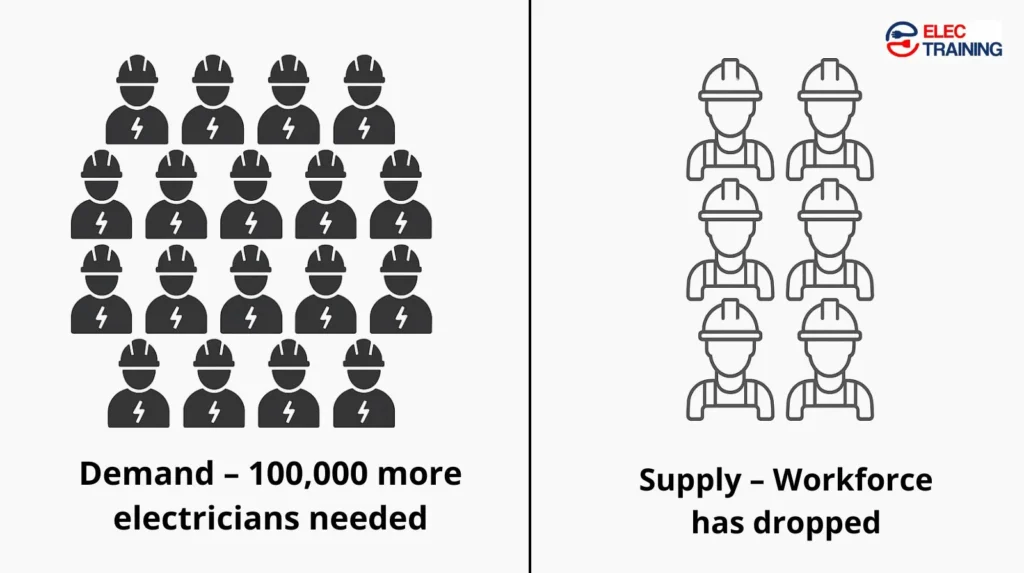
The Realistic Entry Routes at 40
Adults follow the same technical qualification pathway as younger learners, but timelines and funding differ because you’re likely juggling work, mortgages, and family responsibilities. Understanding which route fits your situation matters before committing.
For a complete overview of the qualification structure and how each stage connects, see our detailed guide to becoming an electrician in the UK, which covers both apprenticeship and self-funded adult learner routes.
Adult Learner Route (Self-Funded)
This is the most common path for career changers at 40. You pay for training yourself, which gives you flexibility to study part-time while keeping your current job.
Level 2 Diploma in Electrical Installations (2365-02): Foundation knowledge. Safe isolation, basic circuits, cable selection, BS 7671 fundamentals. Typically 4-6 weeks full-time or around 6 months part-time.
18th Edition Wiring Regulations (BS 7671): The industry standard. You need BS 7671 inside out because it governs every electrical installation in the UK. Takes 3-5 days intensive, then you sit the exam.
Level 3 Diploma in Electrical Installations (2365-03): Advanced content. Inspection, testing, fault-finding, design calculations, detailed BS 7671 requirements. Another 8-12 weeks full-time or up to a year part-time.
NVQ Level 3 in Electrical Installation (2357): Portfolio of evidence from real jobs. Installing circuits, testing installations, completing inspection reports, working across multiple sites. Requires supervised employment. Takes 12-24 months depending on hours worked and how quickly you gather evidence.
AM2 Assessment: Final practical exam. Three days of timed tasks simulating real-world electrical work. Pass this and you’re qualified.
Total realistic timeline: 2-3 years if you’re studying part-time while working, faster if you can commit full-time. The classroom phases are quick. The NVQ portfolio is what takes time because you need actual site work to gather evidence.
Cost: £9,000-£11,000 total for the full package (Level 2, Level 3, NVQ, AM2, 18th Edition). That’s not pocket change, but payment plans exist, and Skills Bootcamps or Advanced Learner Loans can reduce upfront costs.
Apprenticeship Route
Apprenticeships remain an option at 40. They’re funded (you don’t pay tuition), and you earn while you learn, though wages are lower initially.
Apprenticeships cover the same qualifications (Level 2, Level 3, NVQ Level 3, AM2) but take 3-4 years structured through an employer. Starting wages are around £15,000-£18,000 in year one, rising as you progress. Once qualified, you’re typically earning £25,000-£30,000+.
The challenge: apprenticeship funding favours 16-24 year olds, so some employers prioritise younger applicants. But the skills shortage means many contractors are pragmatic about age if you demonstrate commitment and reliability.
Experienced Worker Assessment (EWA)
If you’ve already worked in electrical installations informally (helping out, working as a mate, DIY experience that went beyond basic home improvements), this route assesses what you already know and maps it against NVQ standards.
You need at least 3-5 years of verifiable site experience. You’ll still complete an NVQ Level 3 portfolio, but it’s based on work you’ve already done rather than starting from scratch. You’ll still sit AM2 to prove competence.
Timeline: 6-12 months if you qualify. But this only applies if you can genuinely evidence the experience. If you’re coming from a completely different career, this won’t be available.
Why Being 40 Isn't a Disadvantage
Here’s what no one tells you when you’re panicking about being “too old” to retrain. Maturity is an asset in this trade, not a liability.
Customers trust older tradespeople more. A Watersafe consumer study found that 41 was considered the most trusted age for a tradesperson, with the 36-49 age bracket receiving 50% of votes. When you’re working in someone’s home explaining why their consumer unit needs replacing, life experience and professional communication matter enormously.
Employers value reliability and work ethic. By 40, you’ve learned how to show up on time, manage your own schedule, deal with difficult people without losing composure, and take responsibility when things go wrong. These aren’t skills you get from textbooks. They’re transferable from every job you’ve ever had, and they matter more on site than most people realise.
Adults learn differently, often faster. Research consistently shows that mature learners bring focus and self-motivation that younger apprentices lack. You’re not doing this because your mates are or because your parents pushed you into it. You’ve consciously chosen career change, weighed the risks, and committed. That clarity makes a difference when coursework gets challenging or site work feels overwhelming.
Thomas Jevons, our Head of Training with 20 years on the tools, sees this pattern repeatedly:
"Adults retraining at 40 often progress through Level 2 and Level 3 faster than younger apprentices because they've got the discipline to focus and the maturity to ask questions when they don't understand something. The challenge isn't the classroom content, it's securing the NVQ placement and balancing site work with existing commitments. But once they're on site, their reliability usually exceeds younger learners."
Thomas Jevons, Head of Training
The training structure accommodates adult learners. Courses run evenings, weekends, and intensive blocks so you can keep working while you train. Payment plans exist. Skills Bootcamps (free for 19+ learners in England) and Advanced Learner Loans (repayable once you’re earning over £27,295) reduce financial barriers.
Multi-generational teams perform better. Research shows that older apprentices improve retention rates, boost productivity, and strengthen workplace dynamics. Employers actively recruiting mature learners report fewer disciplinary issues, better safety awareness, and stronger customer relationships.
At 40, you’re not competing against endless 18-year-olds. You’re filling a gap the industry desperately needs filled, and you’re bringing skills that younger entrants simply don’t have yet.
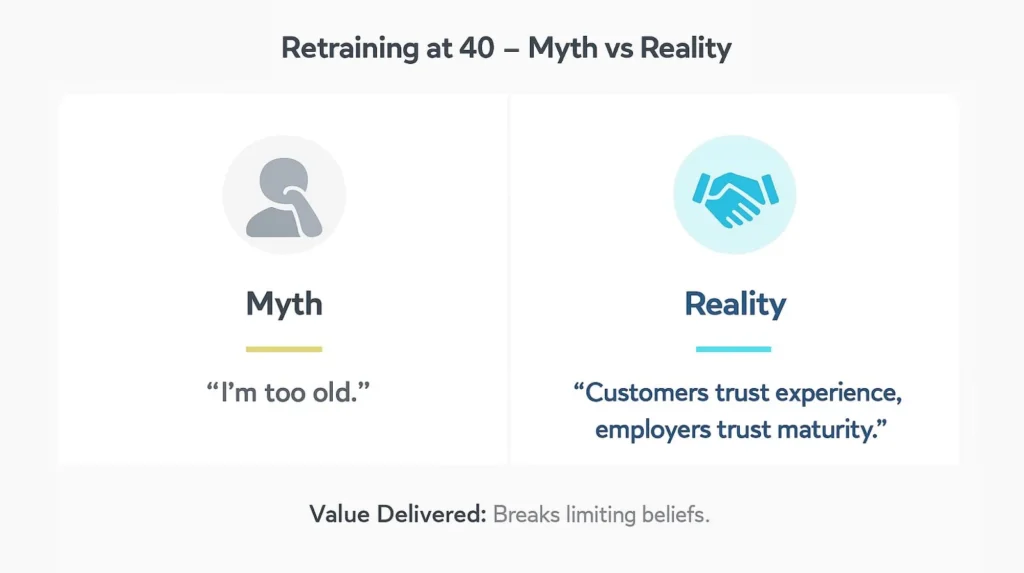
The Challenges You Need to Understand
Retraining at 40 isn’t without difficulty. Understanding what you’re signing up for matters before you commit time and money.
Physical demands are real. Electrical work involves bending, lifting, crawling through lofts, working in confined spaces, standing on ladders, and occasionally contorting yourself into positions that weren’t designed for human access. If you’ve got a dodgy back or knees, this might not be the career for you, or at least not full-time domestic work where you’re constantly in awkward positions.
It’s not brutal. If you’ve got reasonable fitness and no serious health problems, you’ll manage. But if you’ve spent the last 20 years sitting at a desk, the physical adjustment takes time.
Academic challenges after years out of education. Electrical theory, BS 7671 regulations, maths for cable sizing and voltage drop calculations. If you struggled at school or haven’t studied in decades, the classroom content can feel daunting initially.
The reality: electrical calculations are taught with practical context. You’re working out cable sizes for real installations, not abstract equations. The regulations are logical once you understand why they exist. Adults who engage with the material and attend consistently pass just fine.
Financial strain during transition. Training costs £9,000-£11,000 upfront. If you do an apprenticeship, wages start around £15,000-£18,000 in year one. If you’ve got a mortgage, children, and existing financial commitments, taking a pay cut or finding £10,000 is difficult.
Many adults keep their current job while studying diplomas part-time, then transition to electrical work once they’re building their NVQ portfolio. This extends the timeline but maintains financial stability.
Time pressures with family and commitments. Juggling training, work, childcare, and family life isn’t easy. Part-time routes exist (evenings, weekends, block weeks), but they stretch the timeline to 3+ years. If you’ve got young children or caring responsibilities, planning becomes critical.
Employer attitudes can vary. Some contractors won’t consider 40+ applicants, especially large firms targeting younger apprentices for funding reasons. Small contractors (1-5 employees) tend to be more flexible and pragmatic about age if you demonstrate reliability.
Joshua Jarvis, our Placement Manager who works with 120+ contractors daily, explains:
"Some people worry about age discrimination in hiring. It happens occasionally, especially with large firms that target younger apprentices for funding reasons. But the skills shortage means most contractors can't afford to be picky. If you're qualified, reliable, and can prove competency, age becomes irrelevant. The barrier is usually getting that first placement, not your date of birth."
Joshua Jarvis, Placement Manager
Starting at the bottom again. At 40, you’ve likely got 20+ years of work experience, maybe management or specialist knowledge. Retraining means starting as a trainee again, earning trainee wages, taking instruction from people younger than you, and proving yourself from scratch. That requires humility and patience.
The adults who succeed are those who go in understanding these challenges and planning accordingly, not those who expect it to be easy or quick.
What You're Actually Signing Up For
Let’s be honest about what daily electrical work involves. It’s not a desk job with predictable hours and air conditioning. It’s physical, sometimes messy, occasionally frustrating, and always demands attention.
The good aspects:
High demand and job security. The UK needs 100,000 additional electricians by 2032. Nearly 10,000 vacancies were unfilled in recent industry surveys, and 54% of employers expect demand to increase over the next 2-3 years. That translates to genuine job security once you’re qualified.
Strong earning potential. ONS data shows electricians earn an average of £33,495 annually, making them one of the highest-paid trades in the UK. Newly qualified sparks start around £25,000-£30,000. Experienced electricians earn £35,000-£45,000. Self-employed or limited company owners often earn £50,000-£65,000+. In the South-East, sparks invoice at £45-£50 per hour, which works out to around £70,000 annually at 30 billable hours per week.
Flexibility and variety. You can work employed, self-employed, or as a contractor. You can specialise in domestic rewires, commercial installations, industrial maintenance, EV charging, or solar PV. No two days look identical, and you’re not trapped in a single office for the next 25 years.
Growing green skills sector. EV charging installation, solar PV, battery storage, heat pumps. These sectors are experiencing 3.5% annual growth in job adverts and may require up to 200,000 additional workers. If you’re interested in renewable technology, electrical work offers clear pathways into these areas.
The challenging aspects:
Hours can be unpredictable. Domestic electricians usually work standard 8-hour days, but commercial and industrial sparks often work nights, weekends, or whatever hours the project demands. Emergency callouts pay well, but they also mean your phone might ring at 11pm on a Saturday.
There’s inherent risk. Electricity can kill you if you don’t treat it with respect. That’s why training exists, why BS 7671 compliance is non-negotiable, and why safe isolation procedures matter. It’s not a job where you can cut corners or drift off mid-task.
Entry-level competition exists. Getting that first NVQ placement or your first few jobs as a newly qualified spark can be tough. Many contractors want people with experience, creating a catch-22 for new entrants. This is where training providers with in-house recruitment teams (like Elec Training’s network of 120+ partner contractors) make the difference between qualifying and actually working.
Physical toll over time. While the work is manageable at 40, thinking about sustainability over 20+ years matters. Some electricians move from domestic installs (crawling through lofts) to commercial or industrial work (less confined space work) as they age. Others move into inspection and testing, which is less physically demanding.
For more detailed information on what each qualification stage actually involves and how earnings progress as you gain experience, our complete electrician training guide breaks down the full pathway with realistic timelines.
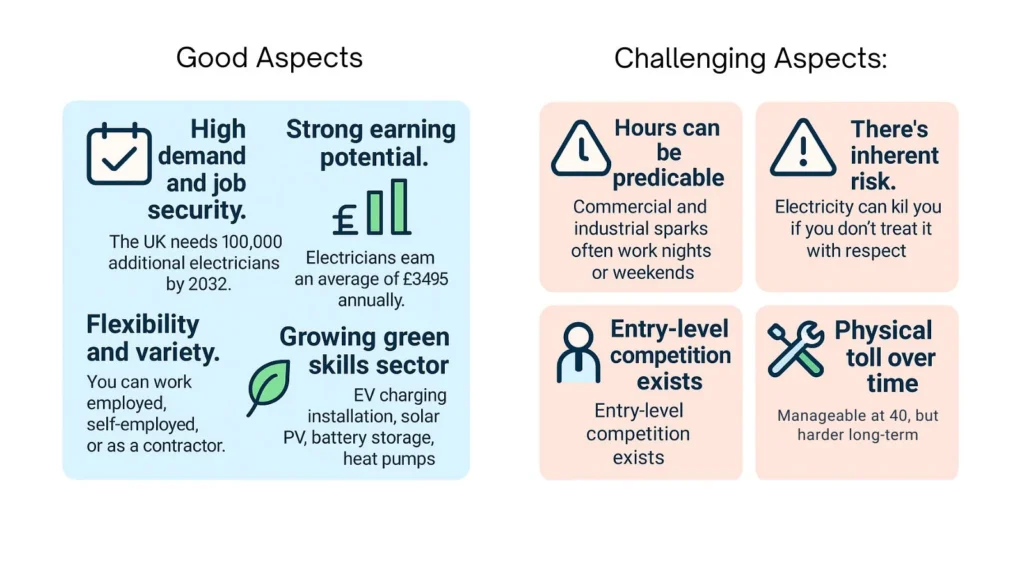
What Real People Actually Say
Forum discussions, social media posts, and direct experiences reveal consistent patterns about retraining at 40.
Success stories are common. YouTube, TikTok, and Reddit feature multiple accounts of people starting electrical training at 40, 45, even 47+. They emphasise that determination and routine matter more than age. Many describe corporate backgrounds (IT, management, logistics) giving them problem-solving skills and customer communication abilities that help on site.
The early months feel overwhelming but manageable. Many 40+ learners describe feeling self-conscious around younger apprentices initially. Some worry they’re “too slow” or “too old.” But most report gaining confidence quickly once practical work begins and they realise their life experience gives them advantages in organisation, communication, and professionalism.
Physical adjustment takes time. People who’ve been desk-based for 20 years describe the first few months as exhausting. Muscles ache. Energy levels drop. But most report adjusting within 3-6 months, especially if they start exercising or stretching regularly.
Financial planning is critical. The most common regret from 40+ learners is underestimating financial strain. Those who succeed typically planned 6-12 months of reduced income, kept part-time work during training, or used redundancy payouts to fund the transition.
Employer attitudes genuinely vary. Some report age-related rejections from large firms. Others find small contractors eager for mature, reliable workers. Networking at trade counters, approaching local electricians directly, and leveraging personal connections help secure initial placements.
Earnings after qualification meet expectations. Multiple testimonials describe reaching £35,000-£40,000 employed within 2-3 years of qualifying, or £50,000-£60,000+ self-employed after building a client base. The financial sacrifice during training pays off once you’re established.
The consistent message: retraining at 40 is harder than at 20, but maturity and life experience compensate for the additional challenges. Most people who commit to it don’t regret it.
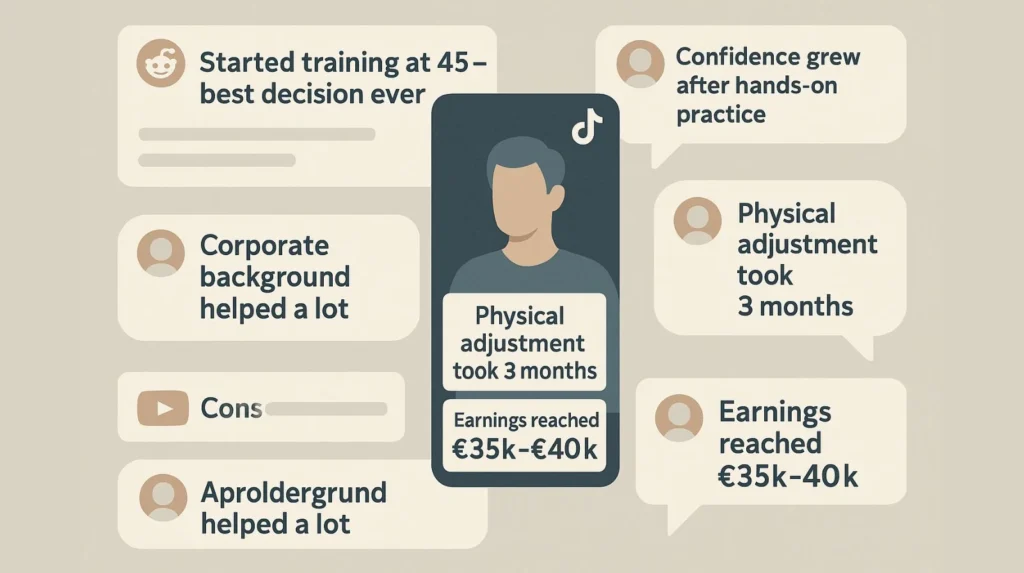
The Myths That Need Dismantling
Misconceptions about age and electrical work deter people who could succeed. Let’s address them directly.
Myth 1: You must start as an electrician at 18-22. False. The average apprentice in England is now aged 36-41. In 2023/24, 48% of apprentices were aged 25+. The industry desperately needs mid-career entrants. You’re not too late, you’re exactly on time.
Myth 2: At 40, you’ll only ever work as a mate, never become fully qualified. False. Adults complete NVQ Level 3 and AM2 in the same timeframe as younger learners (2-4 years depending on route). Once qualified, age becomes irrelevant. Your ECS Gold Card doesn’t have a birthdate on it.
Myth 3: You can’t keep up physically or academically after 40. Partially false. Physical demands are real, but manageable if you’ve got reasonable fitness. Academic content is taught with practical context that adults often grasp faster than younger learners due to maturity and focus.
Myth 4: Employers won’t hire 40+ newly qualified electricians. Partially false. Some large firms prioritise younger apprentices for funding. But skills shortages mean most contractors care more about reliability and competency than age. Small contractors especially value mature workers.
Myth 5: The financial sacrifice isn’t worth it. Context-dependent. If you’re earning £60,000 in a corporate role you enjoy, retraining may not make financial sense. If you’re earning £25,000 in a job you hate with no progression, the long-term earning potential (£35,000-£60,000+) justifies the short-term sacrifice.
Evidence from forums, YouTube testimonials, and employer surveys consistently contradicts these myths. Age discrimination exists in pockets, but it’s not the industry-wide barrier people assume.
Why People Make This Change
Understanding motivations helps clarify whether this career move makes sense for you. Common reasons 40+ adults pursue electrical work:
Escape stagnant or stressful careers. Office politics, corporate restructuring, low pay with no progression. Many describe 20+ years in admin, retail, logistics, or management roles that offer no satisfaction or future. Electrical work represents a clean break into skilled trades with clear career progression.
Redundancy or post-COVID employment shifts. Many were made redundant during or after COVID and used the opportunity to retrain completely. Redundancy payouts often fund training costs.
Interest in practical, hands-on work. After decades of computer-based or service work, many want tangible results. Completing an installation, seeing lights come on, solving electrical problems. Physical work with visible outcomes appeals to people tired of abstract corporate deliverables.
Job security and demand. The UK needs 100,000 additional electricians. Unlike many sectors experiencing automation or offshoring, skilled electrical work cannot be done remotely or replaced by AI. Once qualified, job security is genuine.
Self-employment potential and flexibility. Many 40+ entrants specifically want to work for themselves. Once qualified and experienced, self-employment offers autonomy, schedule control, and higher earning potential (£50,000-£65,000+) without corporate hierarchies.
Green technology and renewable energy interest. EV charging, solar PV, battery storage. These growing sectors attract people interested in environmentally focused work. Electrical training provides pathways into these areas with strong demand and future-proof job prospects.
The consistent theme: people at 40 aren’t entering electrical work because they failed elsewhere. They’re making deliberate career changes toward stability, autonomy, and practical work that offers better long-term prospects than their current roles.
Who Actually Makes This Change
Demographics show clear patterns in who retrains at 40.
Previous careers are predominantly non-technical. Most come from office-based roles (admin, management, IT), retail, hospitality, logistics, or customer service. Very few have construction or technical backgrounds. They’re bringing transferable skills (communication, organisation, customer service) but learning electrical content from scratch.
Family status typically includes dependents. Many are parents with mortgages and financial commitments. This makes financial planning during training critical and explains why part-time routes are popular despite taking longer.
Gender remains heavily male-dominated. Women made up only 2,420 of construction apprenticeships in 2023/24, though this represents a 7% increase from the previous year. Electrical work remains around 98% male, though interest from women is gradually growing.
Regional patterns show acute shortages. England has seen the steepest workforce decline (26.2% since 2018). London, the Midlands, and South-East show highest demand for qualified electricians, creating strongest job opportunities in these regions.
Retention rates are strong. Overall apprenticeship data shows 85% of completers stay with their employer, suggesting mature learners who finish training tend to remain in the trade rather than switching careers again.
If you’re 40, working in a non-technical role, with family commitments, and based in England, you’re describing the typical profile of someone successfully retraining as an electrician. You’re not an outlier. This is exactly who the sector needs.
The Policy Gaps You Should Know About
The regulatory and funding landscape contains contradictions that create barriers for mature learners, even as government policy claims to encourage career changes.
Funding favours younger apprentices. Government apprenticeship funding provides 95-100% coverage for smaller employers hiring 16-24 year olds, but incentives drop significantly for over-21s. Planned changes from January 2026 will further restrict some pathways, making adult entry harder despite skills shortages.
Adult skills spending has declined significantly. Overall adult education funding stood at £4.3 billion in 2023-24, down substantially from early 2000s levels. This reduction directly impacts availability of subsidised courses for career changers.
Training programmes lack flexibility for adult learners. Despite recognition that mature entrants need accommodation for family and work commitments, most courses still run standard daytime hours designed for school leavers, not 40-year-olds with mortgages and childcare responsibilities.
Research on mature electrical entrants is limited. There’s insufficient data on long-term outcomes, completion rates, or career progression specific to 40+ electricians. Policy is being made without robust evidence about what actually works for this demographic.
Contradictory messaging. Government promotes career change and lifelong learning, yet funding structures and employer incentives consistently favour younger apprentices. The system simultaneously recognises the need for mid-career entrants while maintaining barriers that exclude them.
These gaps don’t make retraining impossible, but they do make it harder and more expensive than it should be. Understanding them helps you plan realistically rather than being surprised by lack of support.
So Is It Actually Realistic?
Yes. Absolutely. Becoming an electrician at 40 is not only possible but increasingly common and strategically necessary for the UK electrical sector.
Here’s what realistic means:
Time commitment: 2-3 years. Not 6 months. Not a quick course. Proper qualification requires Level 2, Level 3, NVQ portfolio, and AM2. If you’re studying part-time while working, expect 2-3 years minimum. If you can commit full-time, 18 months is achievable.
Financial investment: £9,000-£11,000. Plus potential income reduction if you switch to apprenticeship wages or reduce current working hours. Payment plans, Skills Bootcamps, and Advanced Learner Loans help, but you need a financial plan.
Physical and mental adjustment. The work is demanding. The training requires focus. Starting at trainee level after 20+ years of experience requires humility. But thousands of people manage it every year.
Persistence in securing placements. The first NVQ placement or first few jobs as newly qualified can be difficult. Networking, approaching small contractors directly, and demonstrating reliability matters as much as technical knowledge.
The UK needs 100,000 additional electricians by 2032. The existing workforce is ageing out (24% are 55+). Post-Brexit labour shortages widened the skills gap. The industry cannot meet demand without mid-career entrants like you.
At 40, you’re not too late. You’re exactly who the sector needs. You bring maturity, reliability, transferable skills, and the kind of work ethic that employers value. The training routes exist. The jobs exist. The earning potential exists (£35,000-£65,000+ depending on experience and employment type).
For a step-by-step breakdown of exactly what’s involved at each qualification stage, see our complete guide to becoming an electrician, which covers timelines, costs, and realistic progression for adult learners.
The question isn’t whether it’s possible. It’s whether you’re ready to commit to 2-3 years of training, manage the financial transition, and navigate the physical and mental adjustment that comes with career change at 40.
What To Do Next
If you’re seriously considering retraining as an electrician at 40, here’s what we’d recommend:
Map out your financial situation. Can you afford £9,000-£11,000 upfront? Can you manage a potential income drop if switching to apprentice wages? Do you have savings, redundancy payout, or access to loans? Be brutally honest about your financial runway.
Research training routes and timelines. Part-time while working (2-3 years) or full-time commitment (18 months)? Apprenticeship (funded but lower initial wages) or self-funded adult route (flexible but expensive)? Which fits your life?
Talk to people who’ve done it. Find 40+ learners on forums, YouTube, or through training providers. Ask about challenges, regrets, and what they’d do differently. Lived experience is more valuable than marketing material.
Test your assumptions about physical work. Spend a day helping someone with DIY, or do manual work for a weekend. If your back hurts for three days afterwards, that’s information worth having before committing.
Contact training providers directly. Ask about part-time options, payment plans, NVQ placement support, and success rates for mature learners. Providers who’ve successfully trained 40+ learners will have testimonials and realistic guidance.
Call us on 0330 822 5337 to discuss the realistic adult learner pathway. We’ll walk you through timelines, costs, and how our in-house recruitment team helps secure NVQ placements with our network of 120+ partner contractors. No pressure. No hype. Just practical guidance from people who’ve helped hundreds of career changers make this exact transition.
You’re not too old at 40. The industry needs you. The training routes exist. The earning potential justifies the sacrifice. The question is whether you’re ready to commit to doing it properly, not whether it’s possible.
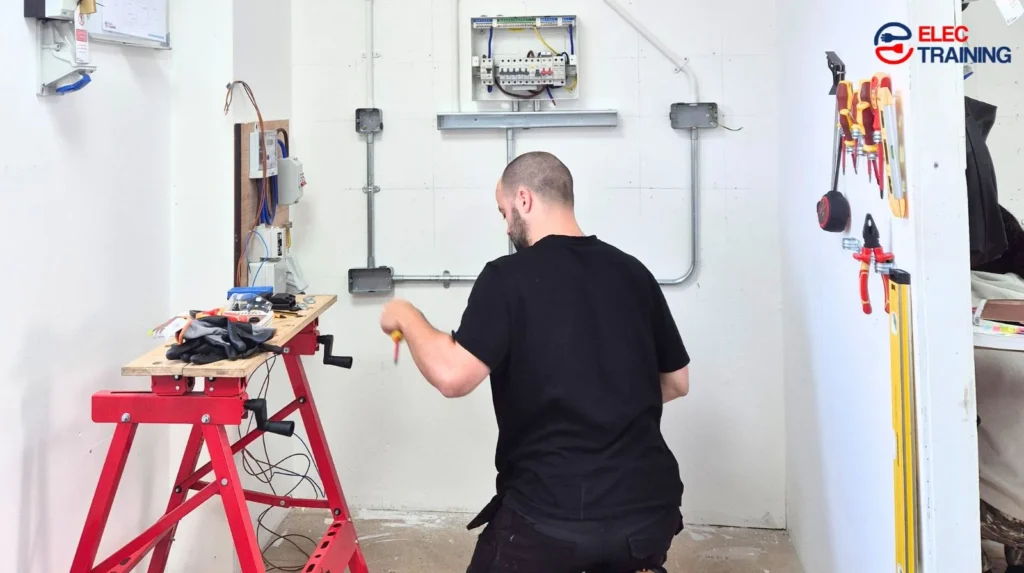
References
- Office for National Statistics (ONS) – Construction Workforce and Electrician Earnings Data 2024 – https://www.ons.gov.uk/
- Construction Industry Training Board (CITB) – Electrical Skills Shortages and Workforce Projections 2024-2029 – https://www.citb.co.uk/
- Department for Education – Apprenticeship Statistics (Age Demographics) 2023/24 – https://www.gov.uk/government/organisations/department-for-education
- Joint Industry Board (JIB) – Employer Demand Survey 2024 – https://www.jib.org.uk/
- Watersafe – Consumer Trust in Tradespeople Research 2024 – https://www.watersafe.org.uk/
- Institute for Fiscal Studies (IFS) – Adult Skills Funding Analysis 2023-24 – https://ifs.org.uk/
- City & Guilds – 2365 Diploma and 2357 NVQ Level 3 Specifications – https://www.cityandguilds.com/
Note on Accuracy and Updates
Last reviewed: 20 November 2025. This page is maintained; we correct errors and refresh sources as workforce data, apprenticeship demographics, and funding policies evolve. Electrician shortage projections reflect CITB forecasts published 2024. Apprenticeship age statistics reflect DfE data for academic year 2023/24. Earnings data reflects ONS construction sector wages 2024. Next review scheduled following CITB 2025-2029 workforce update (estimated Q2 2026).


